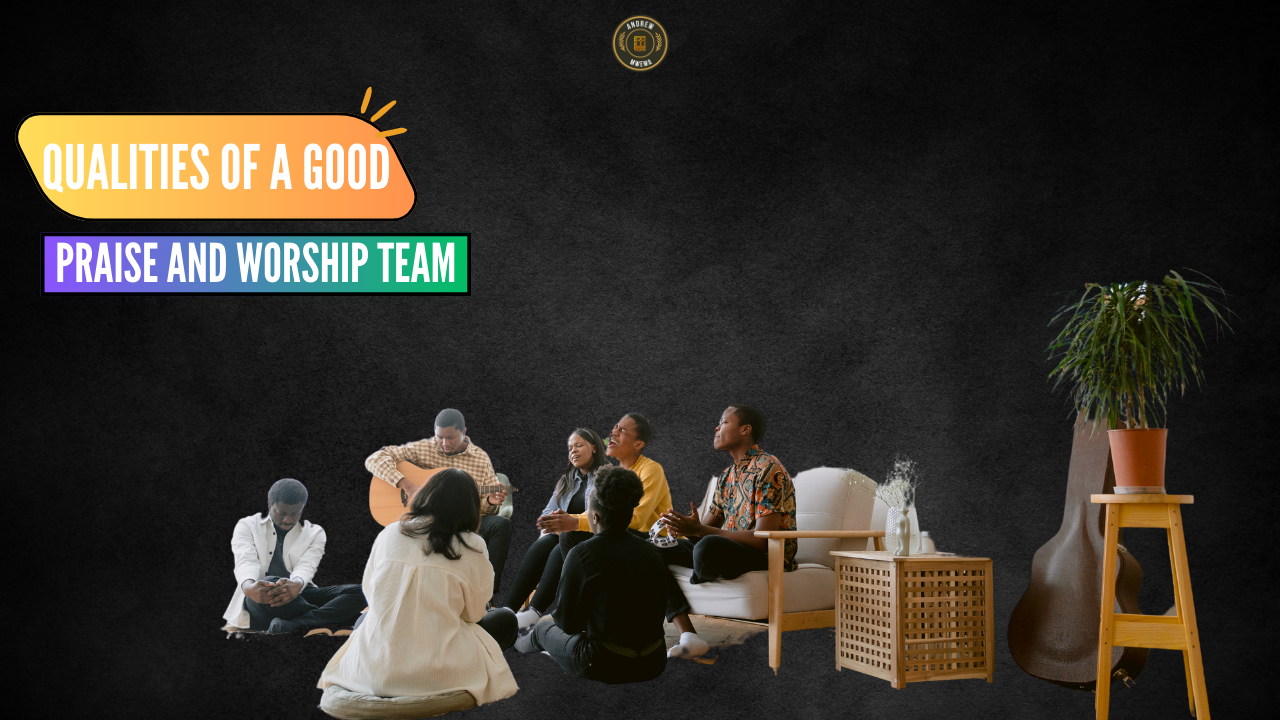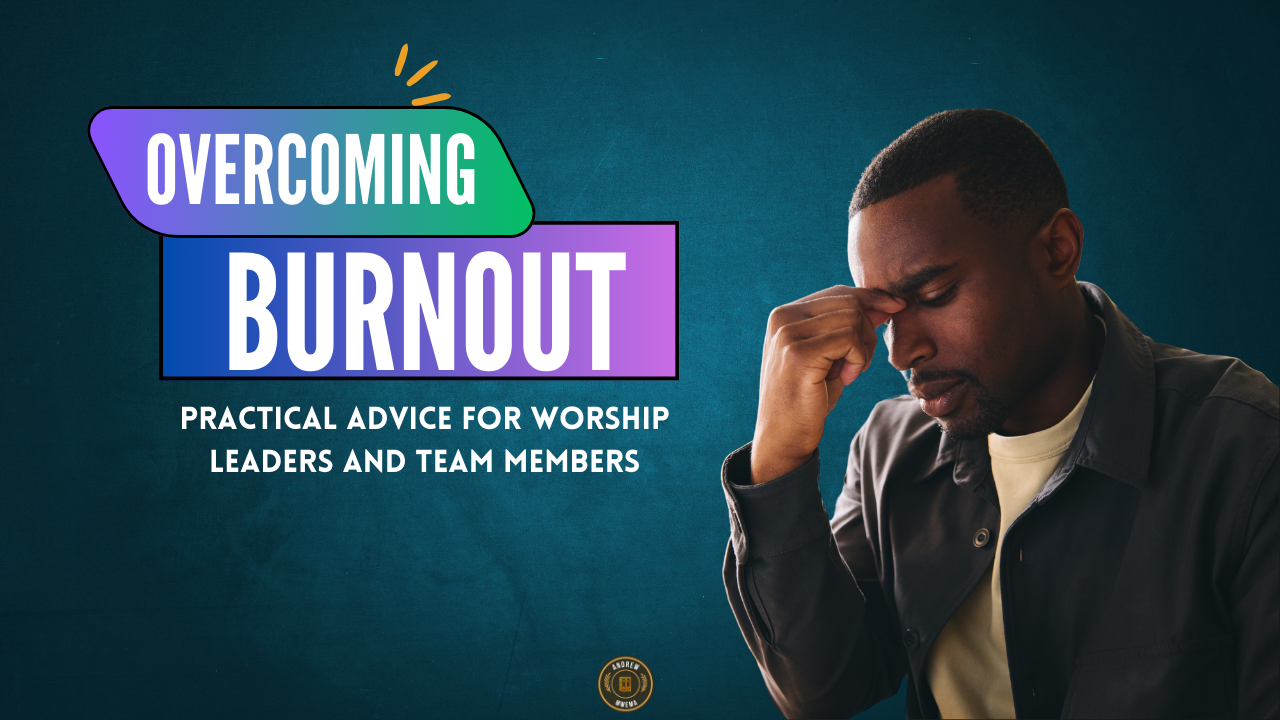Qualities Of A Good Praise And Worship Team
Qualities Of A Good Praise And Worship Team

Spiritual Foundation And Commitment
A good praise and worship team is fundamentally anchored in a deep spiritual foundation and unwavering commitment to their faith and purpose. This spiritual grounding is not just an individual journey but a collective experience that binds the team together. Each member must cultivate a personal relationship with God, marked by regular prayer, meditation, and study of scripture, allowing them to effectively lead others in worship.
Their spiritual maturity should be evident, as they embody the teachings and love of Christ both on and off the stage. This sets a tone of authenticity and sincerity during worship, allowing congregants to connect more deeply with their faith.
Commitment to the mission of leading others in worship is crucial. Members of a praise and worship team need to consistently demonstrate dedication to rehearsals, services, and other commitments the team requires. This reliability reflects their understanding that worship is a vital component of the spiritual life of the church community. Beyond mere participation, this commitment should translate into a willingness to serve selflessly, putting the needs of the congregation and the team above their own personal interests.
Moreover, a strong spiritual foundation and commitment foster a sense of humility and openness to divine guidance. Acknowledging that their talents are gifts from God, the team should remain teachable and responsive to the direction of the Holy Spirit, which requires a posture of continual learning and growth. By submitting their skills and efforts back to God, they become instruments through which spiritual blessings flow to the congregation.
In essence, the unified spiritual foundation and commitment of a praise and worship team cultivate an environment where worship transcends music, becoming a powerful, transformative encounter with the divine.
Musical Talent And Skill
A good praise and worship team requires a harmonious blend of musical talent and skill to create an atmosphere conducive to worship and spiritual engagement. Musical talent, while natural for some, must be honed and developed through consistent practice and dedication. Members of the team should possess a clear understanding of music theory, which serves as the foundation for creating seamless transitions between songs, harmonizing vocals, and orchestrating dynamic shifts that enhance the worship experience.
The ability to play instruments skillfully and sing with proficiency allows the team to deliver inspiring performances that uplift and inspire congregants.
It is crucial for team members to have a keen sense of timing and rhythm, as worship music often involves complex arrangements that can vary in tempo and style. Adaptability is a key aspect of musical skill within a praise and worship team, requiring members to be proficient across various genres to cater to the diverse preferences of the congregation. Whether it’s contemporary Christian music, traditional hymns, or gospel tunes, the team must execute these styles with authenticity and respect for their origins.
Moreover, a good praise and worship team requires collaborative effort. Team members should be able to listen to each other, blending their individual talents to create a cohesive sound. This involves understanding dynamics, knowing when to step forward with a solo, and recognizing when to pull back to allow others to shine. Effective communication is fundamental during rehearsals and live performances, ensuring that each member is aware of their role, cue changes, and any spontaneous adjustments that may arise during a service.
Ultimately, the musical talent and skill within a praise and worship team are not just about technical proficiency, but also about the heart and passion with which team members serve, aiming to glorify God and edify the church through their collective gifts.
Team Unity And Collaboration
A good praise and worship team exemplifies unity and collaboration, which are essential for producing a harmonious and spiritually uplifting experience for the congregation. Team unity begins with a shared vision and understanding of the purpose behind their ministry. When every member is aligned with the goal of leading others in worship and glorifying God, personal egos take a backseat, and collective effort becomes a priority.
This shared mission fosters an atmosphere of cooperation and support, essential for creative endeavors like music and worship.
Collaboration within the team is nurtured through effective communication. Open and honest dialogue ensures that every member's ideas and feelings are respected, and conflicts are resolved constructively. A culture of active listening allows team members to incorporate diverse talents and perspectives, enriching the team's overall sound and presence. Regular practice sessions, as well as times dedicated to fellowship and prayer, further solidify the bonds among members, making it easier to work together seamlessly.
Mutual respect and appreciation for each other's skills and contributions also play a significant role in fostering collaboration. When team members acknowledge each other's unique strengths, whether it be vocal prowess, musical ability, or leadership potential, it builds confidence and inspiration. A culture of encouragement helps individuals feel valued, which in turn motivates them to give their best effort in every performance.
Moreover, a unified team is quick to adapt and respond to the dynamic environment of a worship service, allowing the team to flow with the movement of the Spirit. By being flexible and supportive, members are able to step in and shoulder different responsibilities as needed, ensuring that the worship experience remains focused on connecting the congregation with God. This spirit of togetherness not only enhances the team's performance but also serves as a testament to the power of unity in serving a higher purpose.
Leadership And Communication
A good praise and worship team thrives on strong leadership and effective communication, which are essential components in creating an environment where both team members and the congregation can genuinely connect with the spiritual experience. Leadership within a praise and worship team is not merely about directing musical cues or organizing rehearsals; it involves inspiring and guiding the team to fulfill its spiritual purpose.
A good leader exemplifies humility, vision, and a deep connection to the spiritual essence of worship, encouraging team members to see beyond the technicalities of performance and focus on the spiritual impact of their contributions. This leader not only possesses musical proficiency but also nurtures the spiritual growth of the team, fostering a sense of community and mutual respect.
Communication within a praise and worship team goes hand in hand with leadership. It encompasses more than just the exchange of information; it involves creating an open and transparent atmosphere where team members feel heard and valued. Effective communication ensures that everyone is on the same page, reducing misunderstandings and fostering harmony in both practice and performance. It includes articulating expectations clearly, soliciting feedback, and being receptive to new ideas.
By promoting open dialogue, a praise and worship team leader enables members to voice their concerns and suggestions, fostering an environment of trust and collaboration.
Moreover, non-verbal communication plays a crucial role during performances. Understanding and responding to subtle cues from one another ensures a cohesive presentation that allows the congregation to engage fully in worship. A leader who models and encourages attentive listening and clear communication instills confidence and unity within the team. As a result, the team can focus on their collective mission—to lead the congregation in a transformative worship experience, transcending mere musical performance.
The synergy created through effective leadership and communication is the bedrock upon which a truly inspiring praise and worship team is built.
Flexibility And Adaptability
Flexibility and adaptability are essential qualities for a successful praise and worship team. In any dynamic worship environment, unexpected changes and challenges inevitably arise. These can range from technical issues with sound equipment to last-minute changes in song selection or a shift in the service's focus. A team that is adaptable can navigate these unforeseen events with ease, ensuring a smooth and spiritually enriching experience for the congregation.
One key aspect of flexibility in a worship team is the ability to adjust to different musical styles and arrangements. Worship teams often blend traditional hymns with contemporary Christian music to cater to a diverse audience. Musicians and vocalists who can seamlessly transition between genres and adapt their style to suit the needs of the service contribute significantly to the team’s effectiveness.
Additionally, they must respond to the worship leader's guidance, sometimes shifting keys or tempos on the fly to follow the lead of the Spirit.
Adaptability also extends to team dynamics. Members may need to fill in for one another due to absences, rotate roles, or collaborate in new ways when presenting special pieces or during unique services such as Christmas or Easter. By being flexible in their roles and responsibilities, team members ensure continuity and excellence in worship.
Furthermore, a spirit of adaptability fosters an environment where team members can grow and develop their skills. It encourages everyone to be open to constructive feedback and willing to learn from one another. This openness ultimately enhances the cohesiveness and effectiveness of the team. When a praise and worship team embraces flexibility and adaptability, they not only prepare themselves for the unpredictability of live worship but also create a more profound and powerful worship experience for everyone involved.
Congregational Engagement And Sensitivity
Congregational engagement and sensitivity are crucial aspects of a good praise and worship team, as they directly influence the worship experience's depth and authenticity. A successful team must be attuned to the congregation's needs, moods, and spiritual journey. This awareness begins with keen observation and an open heart, allowing the team to sense the atmosphere in the room and respond accordingly.
By being sensitive to the congregation, the team can adapt their music and message to foster a more inclusive and meaningful worship experience.
Active listening is key to understanding the specific needs of the congregation. This involves paying attention to feedback, both verbal and non-verbal, and being receptive to the community's unique rhythm and pulse. A worship team that engages the congregation often uses a blend of familiar and new songs that resonate with churchgoers, encouraging participation and fostering a sense of unity within the worship space.
The selection of songs with lyrics that reflect diverse life experiences and emotions enhances the emotive connection with the congregation, making each service a personal and communal encounter with the divine.
Moreover, a worship team must be flexible and ready to adapt, as each service may present different dynamics and challenges. Sensitivity to the congregation allows the team to innovate and continuously refine their approach, ensuring that each member feels valued and included. Encouraging input from congregation members helps in building a bridge between the platform and the pews, promoting a more interactive and engaging worship experience.
In this way, a praise and worship team becomes not just a musical ensemble but a vital catalyst for a community’s spiritual exploration and expression, leading worshippers into deeper, more transformative encounters with their faith.
5 Steps to Building a Strong Worship Team
5 Steps to Building a Strong Worship Team provides worship leaders with a clear roadmap to recruit the right people, establish a prayerful and collaborative culture, and lead a unified team. With practical strategies, interactive exercises, and downloadable resources, you’ll learn how to create a worship team that glorifies God and serves your congregation with excellence. Whether you’re starting a team from scratch or strengthening an existing one, this course will inspire and equip you for success
(It's free)
Imagine having everything you need at your fingertips to build, maintain, and supercharge a thriving worship ministry—well, that's exactly what the Complete Worship Ministry Resource Pack delivers! This all-in-one toolkit is your secret weapon, designed specifically for Worship Pastors, Music Directors, and worship teams who are ready to take their ministry to the next level.
Packed with guides, templates, and tools, this comprehensive package covers every aspect of your worship ministry. Whether you're focused on team building, nailing rehearsal planning, or deepening spiritual growth, we've got you covered. From handling crisis management like a pro to ensuring your tech setup is flawless, this resource pack is your go-to solution for creating a worship experience that truly resonates.
Get ready to elevate your ministry and lead with confidence, knowing you have everything you need to inspire and engage your team and congregation!



















